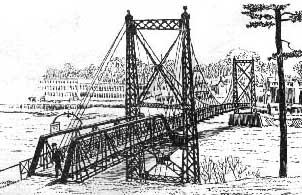 |
Kotlas - Waterville Area Sister City Connection P.O. Box 1747 Waterville, ME 04903-1747 Write to Us |
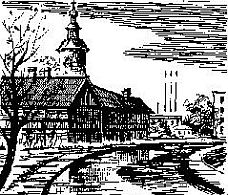 |
![[Show table of contents & options]](../../questionsign.gif)
 |
Kotlas - Waterville Area Sister City Connection P.O. Box 1747 Waterville, ME 04903-1747 Write to Us |
 |
|
Home > Impressions > Summer 2005 |
![[Show table of contents & options]](../../questionsign.gif) |
If you are viewing this newsletter without the table of contents, click the question mark sign anywhere that it appears to display the table of contents and other options. |
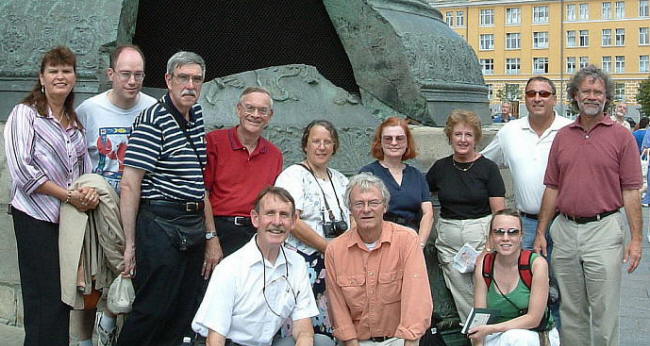 The delegation poses in front of the Tsar's Bell (which is 20 feet high, 189 tons, and never rung) in the Moscow Kremlin. Standing from left to right are Linda Rennebu, Gregor Smith, Carl Daiker, Phil Gonyar, Joanna Hopkins, Ellen Corey, Nancy Foster, Paul LePage, and Ron Turcotte. Peter Garrett, Herb Foster, and Jessica Garrett kneel in front. |
![[Show table of contents & options]](../../questionsign.gif) |
Seven Days in Kotlas |
by Gregor Smith
This August, twelve members of the Kotlas Connection visited our sister community in Russia. The delegation, which included Waterville Mayor Paul LePage, also visited Moscow and St. Petersburg during its seventeen-day Russia sojourn. This visit marked the fifteen anniversary of the formalization of sister city ties between Waterville and Kotlas.
The visit stemmed from an invitation last summer by Kotlas's then-Mayor, Alexander Shashurin, who visited Waterville last summer. As a result of this invitation, LePage became the second Waterville mayor to visit Kotlas; David Bernier was the first, in June 1991. (Due to schedule constraints, Mayor LePage was only able to participate in the first half of the trip only, leaving after visiting Moscow and spending four days in Kotlas.)
Also in the group was co-founder of the sister city effort, Peter Garrett, and his daughter Jessica. In April 1989, the two Garretts and the late Natalia Kempers became the first Americans to visit Kotlas since the Bolshevik Revolution. That visit made possible the establishment of formal sister city ties fourteen months later.
Besides Paul LePage and the Garretts, the delegation included Herb and Nancy Foster, Carl Daiker, and Phil Gonyar, all of Waterville; Ellen Corey of South China; Gregor Smith of Belgrade; Ron Turcotte of Augusta; Joanna Hopkins of Norridgewock; and Linda Rennebu of Cherryfield.
The travelers began their adventure with two and a half days in Moscow touring museums and historic sites, including the Kremlin, the Armory Museum, the Tretyakov Gallery, and the Novodevichiy (New Maidens) Convent. They were also treated to a sumptuous feast at the dacha of Vladimir Piskurev, a wealthy Moscow businessman who was a member of Mayor Shashurin's delegation last summer. The following evening, they took the 22-hour train ride to Kotlas.
The highlights of the group's seven days in Kotlas included a day trip to the historic town of Velikiy Ustyug, famed for its nearly two dozen Orthodox churches; an overnight kayaking expedition on the Northern Dvina River; meetings with the mayor, other public officials and businessmen; and visits to a bakery, an orphanage, a brick factory, a hospital, and a school for the arts.
Wherever they went in our sister city, the visitors were royally treated, greeted with food and drink, gaining new friends — and pounds — along the way. Throughout their time in Kotlas, they were followed by video cameras. They appeared on the local evening news several times, including a fifteen-minute retrospective of the visit on the night of their departure for St. Petersburg, where they spent three days before returning to the U.S.
All of the delegates were overwhelmed by the warmth of their reception in Kotlas and the generosity of their hosts. Jessica Garrett, who was returning to Kotlas for the first time since her historic visit in 1989, was especially moved. She wrote, "As I stepped off the train this time, the memories flooded back to me. I remembered the smiling faces that greeted me at the train station back then. I remembered being met by a girl in traditional clothing holding bread and salt. I remembered meeting my pen pals
Her father added, "The people of Kotlas are family with us. They think of us as family; they treat us like family; they take us into their homes and along with them on family trips and have fun with us. The major difference is that they speak a very different language [and] exist in a different
One can read more from Peter and Jessica Garrett and the other delegates below.
![[Show table of contents & options]](../../questionsign.gif) |
Returning to Kotlas . . . 16 Years Later |
by Jessica Garrett
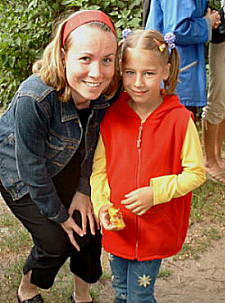 Jessica Garrett (left) with Paulina Shelygina, the 9-year-old daughter of Herb and Nancy Foster's hosts. |
I stepped off the train into bright sunlight after traveling from Moscow for 22 hours. I was back in Kotlas, our Russian Sister City again after 16 years. In 1989 I was one of the first 3 Americans to visit Kotlas since the Russian Revolution. That was part of a trip with my 9th grade class but my father, Peter Garrett, my adopted Russian grandmother, Natalia Alexeyevena Kempers, and I split off from the group to make a special trip to meet the people of our sister city. I only have a few clear memories of Moscow and St. Petersburg from that trip (probably because at age 14 I was distracted by adolescent concerns) but I remember everything from Kotlas.
As I stepped of the train this time, the memories flooded back to me. I remembered the smiling faces that greeted me at the train station back then. I remembered being met by a girl in traditional clothing holding bread and salt. I remembered meeting my pen pals, Nadya and Alyona and being ushered into their warm and cozy apartment filled with food and gracious hospitality. I remembered the kindergarten with its rosy-cheeked children and committed teachers. I remembered Zina's class full of friendly students. I remembered Slava, Galina and Vika caring for me one day when I was feeling ill. I remembered Nikolai's omnipresent camera and notebook and the loving, fatherly way in which he looked at me. I remembered the beautiful faces and hearts of Lyuba and Yelyena.
And here they all were again, looking as though 16 years had not passed by, hugging me at the train again and introducing me to so many new wonderful people. I had tears in my eyes as I looked again on those dear faces.
This time I saw so many more places: the hospital, bakery, lumberyard, brick factory, honey farm, museums, shops and restaurants. I enjoyed going back to the kindergarten and seeing a teacher who I had met all those years ago. We took a picture with her granddaughter. My pen pals are now mothers. They and their parents, Tatiana and Sergei, took me out to their dacha and showed me how a proper Russian banya is done with birch branches and steam.
One of my most vivid memories was our "Extreme Russian Adventure" where we took inflatable kayaks and catamarans down the river and camped overnight. It was not a long trip, and our guides could drive in the food to the campsite, but it turned out to be "extreme" because the catamarans were almost impossible to steer and kept deflating. Then Herb [Foster] was stung by a wasp and his hand swelled up so much that he couldn't paddle. I was experiencing traveler's stomach issues that day and so found myself rather weak. Luckily a mom and daughter who had read about our trip in the newspaper offered to paddle me for a while. At night I looked up at the sky that was still bright at midnight and fell asleep to the sounds of Vanya playing guitar and singing Russian songs by the campfire. Our Russian friends who stayed behind were worried about us but we all survived and met the television cameras at the end with smiles.
The week was packed so full I barely had time to sleep, let alone write in my journal, but the overwhelming sense that I am left with is that of love. I didn't think it possible that I could feel so strongly about a group of people, most of whom I met only once when I was a girl, and many with whom I can only communicate by nodding and smiling or waiting for a translator. And yet I realized as I waved and blew kisses out the window of our departing train, those faces are as dear to me as family, and they and Kotlas will always be in my heart.
![[Show table of contents & options]](../../questionsign.gif) |
Getting Around in Russia |
by Carl Daiker
 Carl Daiker |
Coming from a public transportation background, I was struck by the ability of the average Russian to get almost anywhere (in the cities of Moscow and St. Petersburg or in the rural countryside surrounding Kotlas) by public transportation. If you can't get where you are going by bus or tram, you can get there by train (or in the case of the big cities) by metro. From all appearances public transportation in Russia is well used and affordable.
I was also struck by the fact that capitalism in Russia seems to be coming on like a fast-moving freight train, and with it the joys of car ownership. We were told by our tour guide in St. Petersburg that there are already two million cars on the streets and highways of that city. This number is expected to double in just two years. I
 A bus and cars on the bridge over the tracks near the main train station. |
I mentioned this briefly during the time we were in Russia, but I think it bears repeating. I moved to Waterville from the State of New York about 10 months ago, and in that time I have met many wonderful new friends, including the members of the Kotlas Connection. Then I had the opportunity to travel to Kotlas with some of the members of the Connection. There I met many other wonderful, new friends. Both my new Maine and Russian friends have helped make my transition to Maine a warm and uplifting experience, and I thank you for that.
![[Show table of contents & options]](../../questionsign.gif) |
Food and Fitness |
by Ellen Corey
 Ellen Corey |
When the members of the Kotlas Connection arrived in Moscow, there were hundreds of soldiers on the streets around our hotel near Red Square. Our guide said that is was a holiday celebrating the armed forces of Russia. She also said that, since a lot of alcohol was being consumed, we should be very cautious when we went outside the hotel. It would probably take a full-scale revolution to keep intrepid tourists indoors on the first day of a trip, so several of us did venture forth. While keeping a cautious eye out for soldiers who looked like they might have reached the belligerent stage, I began to notice something unusual about these guys. They were all so trim! Not a beer belly or love handle on any of them.
Observing waistlines became a minor obsession for the entire trip. From Moscow to Kotlas to St. Petersburg and all the train stops and side-trips in between, I never saw an overweight child or young adult. I thought this was remarkable since everyone seems quite adequately fed, and especially in view of the prodigious amount of food guests are served at every house. Remarkable, but not mysterious. They eat lots of fresh, home-grown vegetables at every meal (in August, cucumbers are regular breakfast fare). They serve the food on smaller plates, effectively limiting portion sizes.
On our last night in Kotlas we had a going-away party with the Waterville Committee that included a five-course meal. Afterward, my host family and I went to their dacha where they immediately began setting out a platter of fruits, including berries that had been picked that day. I started laughing and asked why in the world we were eating again when we had just had a huge dinner. They said we weren't having more food, just fruit. And they were right. We were snacking on healthy food, not chips and dip.
And Russians get their exercise by walking everywhere. Although there are now more family cars than ever before, the streets are still full of people walking to the stores. They walk the dirt paths between villages. The five-story apartments don't have elevators. I asked my host family, who had visited me last year, what surprised them most about America. One of the things they noted was schoolbuses. Russian kids walk to school, and in summer they are outside running around. Creature comforts in Russia might fewer than those we have become accustomed to here, but in my opinion, this is a blessing in disguise. Out of necessity, Russians practice what Americans preach about nutrition and exercise.
![[Show table of contents & options]](../../questionsign.gif) |
An Outstanding Visit |
 Linda Rennebu |
by Linda Rennebu
The visit to Kotlas was outstanding. It is a city that seems to be gaining in so many ways. The people were certainly welcoming. My host family acted as a true family, I felt at home and enjoyed each day and each family event. There were so many wonderful events and so many places visited. For me the most outstanding visit was to the Kotlas Orphanage. The orphanage seems to be providing all these special children require in terms of physical, developmental, and social needs. They are certainly to be congratulated on their outstanding program.
![[Show table of contents & options]](../../questionsign.gif) |
Visiting Old Friends |
by Phil Gonyar
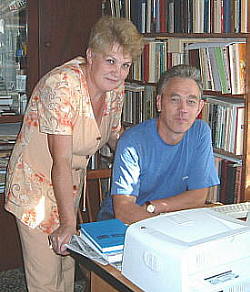 Nikolai and Valentina Sheptakov in his home office. |
When asked why do you keep going to Kotlas, my response is that it is like going to visit relatives or long time family friends. And this fifth visit was no exception. Perhaps you'd be interested in hearing about some of the Kotlas folks who have visited the Waterville area.
As usual my host family was Nikolai and Valentina ("Valya") Sheptakov. I feel right at home in their apartment. Since there last, they have remodeled their kitchen — new cabinets, appliances, and furniture. It's all the better to enjoy Valya's delicious meals. Both of their children are now married. Son Kostya and his wife will soon move into their new apartment built by Andrey Palkin, the Kotlas contractor who was in Waterville in June, 2004. Nikolai is once again engaged in his favorite work, editing for the local newspaper. Valya works in the Kotlas hospital. While in Kotlas I helped celebrate their only grandson's fourth birthday.
On the day most of our visiting group was on the river "extreme" I had the opportunity to visit the homes of three other friends. First was with Zinaida Yegorova who has been to the Waterville area several times as the guest of Mary and Earl Coombs. Breakfast there was shared with Zina and Leonid's children, Anya and Sasha, who were on vacation visiting with their folks. Of course, the star of the moment was Anya's infant son. Anya, as you might remember, spent a year here while attending Winslow High School. Dropping in for breakfast was Sasha Sinitsyn who was one of the Kotlas students participating in the Rivers Project. Zina is still teaching part time.
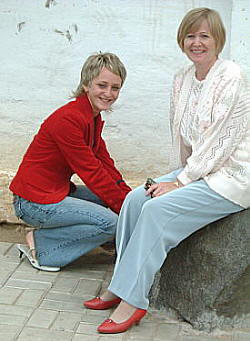 Vera (kneeling) and Lyuba Zinovkina in Velikiy Ustyug. The rock is said to have magical, healing powers. |
Next visit was with Vyacheslav ("Slava") Chernykh, the engineer who was part of the first official delegation from Kotlas to the Waterville area in 1990. He was joined by his granddaughter, Alina, who lives with her grandparents. Before we left, Galina, Slava's wife, came home for lunch. While enjoying homemade Russian donuts, we caught up on recent happenings. Slava is officially retired but does considerable private contracting.
Nikolai then met us in his new green Lada, and off we went to Vychegodsky for lunch with the Trofimov family. Son Sergei was in Waterville in 2003 to participate in the Russian Sampler. Sergei is now attending Moscow State University majoring in mathematics. By the way, Olga Gorshkova, who was in Waterville at the same time at Sergei, was also home from Moscow State University where she is majoring in journalism. It was pleasant meeting the Trofimovs, mom, dad, and younger brother.
On another afternoon, I had tea with Andrey Bralnin and his family. He is hoping to visit us again in the spring. Andrey is deputy mayor of Kotlas and was here last June with the delegation.
Throughout the time in Kotlas there were encounters with others who have been to Waterville. Lyuba Zinovkina and daughter Vera were frequent translators for me. Yelena Cherkova was mistress of ceremonies at the dinner party we gave for our host families. Irina Reznichenko, who currently chairs the Waterville Committee, was with us frequently. Inna Tushina was very active in hosting our delegation. I also enjoyed an evening at the dacha of former mayor Alexander Shashurin. How good it is to meet old friends.
![[Show table of contents & options]](../../questionsign.gif) |
Brief Impressions |
by Peter Garrett
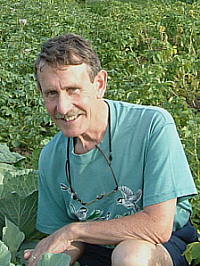 Peter Garrett kneels in a dacha garden. |
This was my third visit to Kotlas (the first two being 1989 and 1991). On the previous two, in April and June, there had not been an opportunity to visit a dacha. But this time I was very pleased to be taken to several. I was immensely impressed at the skill of so many people in the art of growing vegetables. Almost everyone seems to take pride in that art. However, now that it is no longer essential to grow one's own vegetables to survive difficult times, more people may opt to buy vegetables.
A big difference from 1991 until now is that almost everyone is a churchgoer, even the ardent communists of earlier times. Russian soccer players on TV cross themselves before the play starts and when a goal is scored. New churches are being built all over the place, on Red Square in Moscow, and in Kotlas too. And strangest of strange, the entire family of Czar Nicholas II has been sainted — you can buy icons of them at the railroad stations.
In a sister city relationship one can expect some unusual trips. This time we were treated to a visit to a state-run bakery that had been losing trade to small private bakeries. It was about to be put on the block for privatization. We were treated not only to the tour of the working facility, but the candor of the current management team. We also got a tour of the world of a local entrepreneur who not only builds very nice looking apartment buildings, but also owns the brick factory and lumberyard. (He exports his kiln-dried pine boards to the US). All are very successful enterprises, which net a lot of money and a social conscience — he looks after his workers in many ways, and will soon be building the latest church.
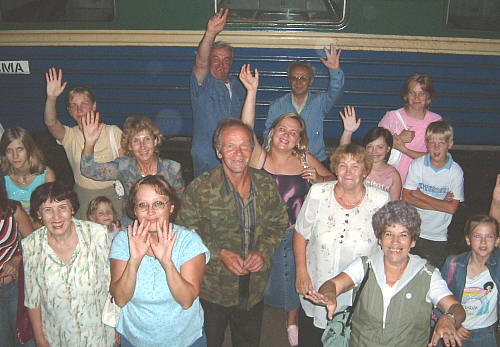 Here is a picture of our friends in Kotlas waving goodbye to us at the train station. Doesn't it occur to you as a family picture? |
One surprise for us was that, despite the fact that the people of Kotlas do a lot of walking in town, and love to go out to their dachas in the summer, they don't get out on their beautiful river. When we requested a camping trip down the river in little boats, it was called "the extreme". One day was a bit extreme, paddling against a strong wind. But the next was pure joy, drifting with the current under perfect skies. The TV station came to interview us when we landed, asking us questions about our extreme activity.
My strongest impression is of family. The people of Kotlas are family with us. They think of us as family; they treat us like family; they take us into their homes and along with them on family trips and have fun with us. The major difference is that they speak a very different language, exist in a different culture, and their home is located about one third of the way around the globe from ours, eight time zones to the east in northern Russia. Despite this, we communicate well, by body language, by translations from those of us who speak Russian and the several of them who speak English, and by struggling with the language ourselves.
![[Show table of contents & options]](../../questionsign.gif) |
"Extreme" Hospitality |
by Nancy Foster
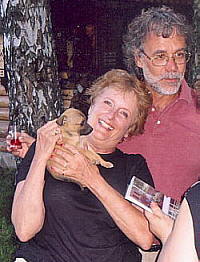 Nancy Foster cuddles a puppy at Vladimir Piskurev's dacha near Moscow. Ron Turcotte stands behind her. |
I was overwhelmed with the hospitality I experienced in Kotlas.
The host families made sure that we met their extended families and their extended family members were prepared with English phrases, welcoming us to Kotlas and saying they were happy to meet us.
There was an endless amount of food available, always, and in the most unique places. From city hall, to a remote village, the birthplace of Admiral Kuznetzov , to the stern of a cruise boat in the Dvina.
There was music, proudly played and sung for us and even a CD for us to take home to remember them by.
There were saunas in their banyas; they made sure we got the full experience of it all. There was eating a meal for hours on end, way into the night with no urgency to get up and "do the dishes". Food was attractively displayed on long tables covered with fresh linens, so again, there was no frantic preparation by our hosts, which made us feel they enjoyed the party as much as we did.
I take away from Kotlas, the "extreme" hospitality of good food served in abundance, a sharing of themselves and their families so lovingly and genuine.
I was also impressed with how every one seemed to know everyone and looked out for each other. There was a tremendous amount of networking going on made easier with cell phones.
The fact is there seemed to be little class distinction. The wealthy were comfortable with the not so wealthy. In my mind, they have a rich heritage and a sense of wealth to be proud of in the fact that they have their priorities in the right place. There was a sense of pride in the way they showed us in their city
They made sure we got the full experience of their city and their traditions, and shared with us all they hold dear.
Our departure from Kotlas was another awesome experience. They came to the rail station in numbers, showering us with yet more gifts and helping us load our luggage on the train and standing on the platform blowing kisses until we pulled away from the station, tears in our eyes.
I take away from Kotlas, the "extreme" hospitality of good food served in abundance, a sharing of themselves and their families so lovingly and genuine. I now have family in Kotlas and will cherish this visit in my heart always. Language is no barrier!
![[Show table of contents & options]](../../questionsign.gif) |
An "Extreme" Adventure |
by Gregor Smith
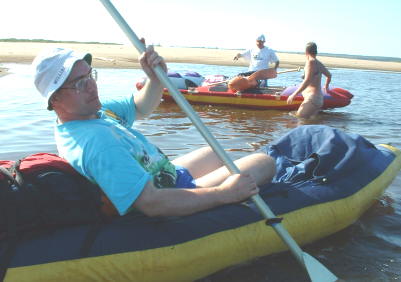 Gregor Smith takes break from paddling. |
We started the "extreme" near the village of Medvedki, 15 mi. (25 km) up the Northern Dvina (south) from Kotlas. From where our bus deposited us, we walked a kilometer or two down a rough dirt road to a clearing where our guides for the expedition were preparing soup over an open fire. At one edge of the clearing, they had laid out the motley collection of inflatable craft that would carry us down the river to Kotlas.
There were eight or nine vessels in all: inflatable kayaks for one, two, and three people and two rafts, each made of two inflatable pontoons lashed together with twine and having a board platform on which two or three people could sit and paddle. There were eight Americans in the group — Herb and Nancy, Peter and Jessica, Ron, Ellen, Joanna, and myself — and, it seemed, twice as many Russians.
After eating, we carried our vessels to the river. Because the water was low, as is normal at that time of year, we had to walk quite a long way over the sand to get to a spot where we could launch our craft.
For most of the journey, I was alone in one of the two one-person kayaks. This suited me just fine, as it allowed me to paddle back and forth among the other craft in our flotilla. While I couldn't keep it from waggling first left and then right as I paddled, it was more maneuverable than the other craft in our ragtag fleet, especially the pontoon rafts. As the wind was blowing against the current, the raft riders had a terrible time maintaining a straight course.
This section of the river was more than half a kilometer wide. Having only a slight current, it seemed more like a lake than a river. Despite its recreational potential, we saw few other boats plying its waters and only an occasional house along its banks.
Unlike our Maine rivers, there are no rocks or rapids, but there are long sandbars carved by wind and waves. Nor are there any dams anywhere along the Dvina's course. The only obstacle to navigation is the occasional half submerged log with one end mired in the river bottom, a remnant of a past log drive.
In the spring, when the ice breaks and the snow melts, the river swells to twice its late summer width. As the land is flat and the banks are sand, not rock, there is little to keep it from going where it wants to. In August, however, it is placid, a slumbering giant stirring only occasionally.
Despite getting a sunburn — who would have thought that the sun could be so unrelenting at this high a latitude this late in the summer — I enjoyed myself immensely, although we were never given a clear idea of how long the afternoon's journey would last. Whenever we'd ask our guides, we would be told that it was "just one kilometer more" to our campsite. I don't know how far we traveled that day, but after four hours of paddling we arrived at the chosen spot on a high bluff on the western bank.
The brightly colored tents were being set up as I arrived and the fire had been started on which to cook our dinner, a hearty meal of stew and salad and bread. Before eating, I had time to take a short swim in a nearby spring-fed saltwater pond.
Although the sun set around 9:15, at that high latitude, it took the sky a good hour and a half to get dark. Several us sat up late, drinking tea and sitting near the fire to ward off the evening chill, while the Russians regaled themselves and us by singing Russian ballads to guitar accompaniment.
In the morning, we had a meal of hot kasha (Russian oatmeal), before breaking camp and resuming our journey. Several of our party, still exhausted from their struggles of the day before, left the party to return to Kotlas by car. I managed to take a quick dip in the Dvina before we departed, but finding the current surprising strong. I let myself float downstream a little ways, but had to swim with all my strength just to stay in place when trying to return to the spot where I'd entered the water. Instead, I got out and walked along the bank.
As there was no wind, we had a much easier journey than we'd had the previous afternoon. I was in a solo kayak again. At times, I lay back and let the current carry me.
We arrived in Kotlas, at a beach just below the former passenger river terminal, around 1:00 in the afternoon. There we were greeted by our host families and two different film crews. Several of us, including myself, were interviewed on camera and later appeared on the evening news. In the company of two giggling college girls who were studying English, I walked back to my host mother's apartment. I was tired, but happy.